[Click on BLUE links for sources and information]
And he struck Job with a grievous burning rash from the soles of his feet to the crown of his head.
Job: 2-7 [The Wisdom Books: Job, Proverbs, and Ecclesiastes: A Translation with Commentary, Robert Alter]
In the depths of winter, I finally learned that within me there lay an invincible summer. Albert Camus
We remain temporarily down and out at Think in the Morning. As previously noted, we are supplementing our usual nonsense with some Guest Posts as they become available. In the meantime, by way of explanation, we issue the following report.
Our Blogger in Chief has been diagnosed with “a mild case of eczema.” As anyone similarly afflicted will tell you, there is no such thing as a “mild case” of this abominable disease. Such a diagnosis reminds me of President Truman’s quip about the economy: “It’s a recession when your neighbor loses his job; it’s a depression when you lose your own.” However much your blogger feels the itch, he is surely not as badly afflicted as young Niall Sullivan in Maggie O’Farrell’s book.
Niall Sullivan waits, standing on the school steps—his father is, of course, late. He holds his arms slightly away from his body so that the early fall air may pass around him, between his limbs and his torso, between his fingers where webs might have been in another life. His skin, the outermost layer of him, prickles and seethes like lava. If he stands still enough, his clothes won’t rasp against it. This is one of the ways Niall has developed to deal with his eczema. Coping strategies, the doctor calls them … Niall has been coming to the Pediatric Acute Dermatology Daycare Unit his whole life. It’s a place for the city’s most severe, most afflicted: you don’t get to come here if you have a bit of an itch now and then, a slight rash on the backs of your knees. This is for kids who are inflamed with eczema, head to foot, kids for whom normal clothes and unbroken sleep are impossibilities. Maggie O’Farrell, This Must Be The Place
Yes, it is a mild case compared to some of the horror stories out there. Kaspar Mossman describes his lifelong conflict with eczema in an article posted by the National Eczema Association.
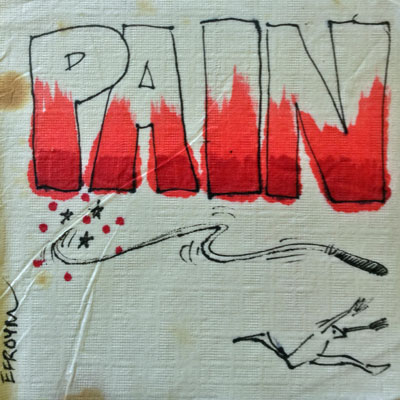
Sea Gull Cellar Bar Napkin Art, Max Efroym artist
I’ve suffered from chronic itch all my life: forty years and counting. I have eczema. A dermatologist told me I was the worst case she’d ever seen. Genetics and environment may have combined to intensify my condition. My paternal grandfather, a legendary curmudgeon, had eczema, and it afflicts my sister, my daughter, and a cousin. I spent my first decade on the Canadian prairie, with its extremely dry and hot summers and bitter winters. And my father smoked cigarettes in the house until I was seven years old.
Whatever the causes, I’ve spent countless nights in the grip of itch, tearing at my skin to wake in the morning with crusty gashes on my hands, face, and elsewhere. As I type these words, under the stress of composing prose, I reach under my desk to scratch the back of my knees. To live with eczema is to fight a war for control of your own body—with the goal of enjoying life, even temporarily, as people with normal skin do. Kaspar Mossman, Living With Itch: A Patient’s Guide by Gil Yasipovitch, M.D. and Shawn G. Kwatra, M.D.
Over 30 million Americans have eczema. Still, it’s inevitable you will find yourself, like Job, beseeching the Lord: “Why me, God? What have I done wrong?” Nothing probably and that’s the rub. Chalk it up to bad luck. Eczema is not contagious. You can’t “catch it” from someone else. There is no cure for eczema but there are treatments. We don’t know what exactly causes eczema. However, for most types of eczema, researchers believe a combination of genes and a trigger are involved.
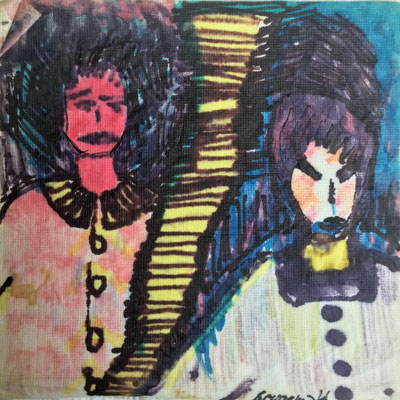
Sea Gull Cellar Bar Napkin Art, Estelle Grunewald artist
Eczema: the origin of its name – “ekzein,” Greek for “to boil
They say your body changes every seven years. That’s not quite true. Some of your cells change every few days. Others never change. Over seven years you pretty much consist of all new parts. It’s called repair and maintenance. When you think about this you may be confronted with some tricky philosophical problems regarding identity. Think of The Ship of Theseus. Interesting as those questions may be, they are not our concern here. Nor is it our concern what happens when the parts that once made you you no longer stick together.
“I give some patients a pill, a patch, an injection. But what I am seeing in your case is that you need to think of your itch as a long-term commitment.” Don DeLillo, The Itch
Our concern here is to understand as best we can what happens when these periodic changes in composition summon forth what Dante calls “the endless rage of that itch no emollient controls.” (Canto 29, line 93, The Divine Comedy, Dante, translated by Clive James) ECZEMA is our cross to bear. We fess up. It is eczema that plagues us and prevents us from pursuing our noble cause, THE BLOG.
You don’t want anyone to worry about you, so you make your life out to look perfect on the outside. You try your hardest to tell your friends you are fine. You do you best to post smiling and cute pictures on your social media channels and you do whatever it takes not to be asked, “Are you OK?” [Daniel Boey, Behind Every Itch Is A Back Story]
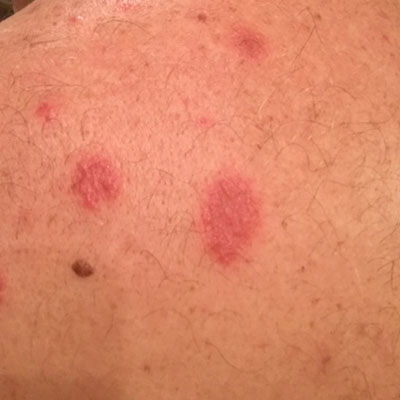
Our Blogger in Chief (left shoulder)
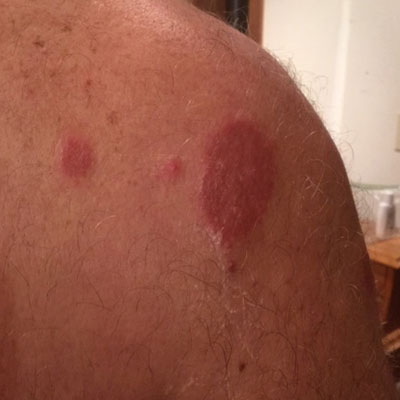
Our Blogger in Chief (right shoulder)
There is a certain shame and embarrassment in having a disease of the skin. It is natural to try to hide it. We decided to bare all, write this blog, not to solicit your pity or concern or recommendations but in the spirit of finding the truth. It is a self-help project. It may not work but it’s still worth a try.
… stupidity, like eczema, certainly cannot be cured [Daniel Boey, Behind Every Itch Is A Back Story]
The itch, the discomfort, the rash, the inflammation, the redness, the maddening, distracting ailment: this is not him. It is not who he is. There is him and there is his condition. They are two entities, forced to live in one body. Maggie O’Farrell, This Must Be The Place
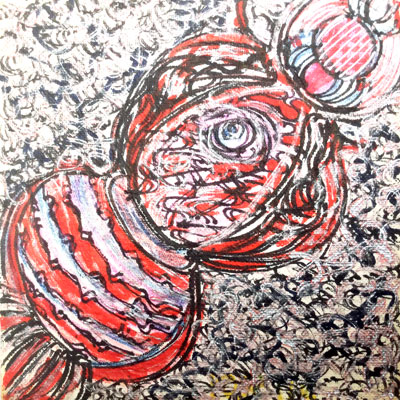
Sea Gull Cellar Bar Napkin Art, artist unknown
In our peculiar schizophrenia we at Think in the Morning analyze life through the double frames of literature and science. Somewhere in the mix we believe the answer to almost anything can be found. No surprise then that that is where we looked when attacked by the fierce dragon of eczema.
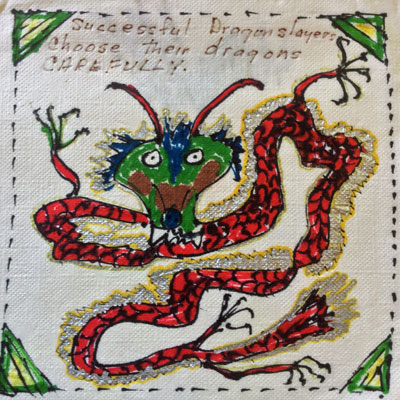
Sea Gull Cellar Bar Napkin Art, artist unknown
There is a problem with over-analysis. Analysis paralysis. Thinking requires complete concentration. Focused attention on eczema can increase the itch. Author Don DeLillo explains this masterfully in his short story.
Two hours later he was back on an exam table, seated at the edge, doctor in her sixties studying his left forearm, lifting and looking, peering into the scratch marks, into the pores, the tissue itself.
“Do not let others scratch your itch. It will not succeed,” she said. “You yourself must scratch.”
[Napoleon, in legend and almost certainly in fact, for years was tormented by severe itching. Wayne Whipple, in ”The Story-Life of Napoleon,” pictures him in the heat of battle, ”stripped to the skin, lying on straw or on the bare ground, surrounded by his aides, who were scratching his quivering flesh till the blood flowed, while he was shouting at them: ‘Harder!’ ” The Ignominious Itch, Robert Kanigel]
The room was small and seemed semi-abandoned—stale air, rumpled documents pinned to corkboards, things scattered randomly.
The doctor asked him questions and then repeated whatever he said. He tried to place her accent, Middle Europe maybe, and this gave him confidence in her abilities.
“When itching stops now and then, five minutes, six minutes, you are a little bereft. What do you think?”
He looked for a smile but it wasn’t there.
“You will spend less time in the shower.”
“I have been told this.”
“You have been told this. But not by me,” she said.
She was looking directly into his face now. She looked and talked. He was sure that she spoke four or five languages.
“Other patients, they are worse.”
“I am also worse.”
“You are nowhere in the competition.”
“I fool myself. I try to talk myself out of being worse.”
“You are eating. You are sleeping.
“I am eating. I have forgotten how to sleep.”
“The older you will get, listen to me, the less you will walk and talk and the more you will itch.”
She kept on looking, staring him into deep levels of retreat.
“Look at where we are, in the last room at the end of the long hall. I will walk four times a day from there to here and then from here to there and all over again. I try to tell myself this is not a thirteenth-century hospice for the destitute and the dying. But it is not so easy for me to be convinced.”
He liked listening to her but she was speaking into free space.
“When I talk to non-itching people about the itch, they start itching.”
“This is true?”
“This is true,” she said.
The Itch, Don DeLillo, The New Yorker, August 7 & 14, 2017
Can we really fool ourselves, talk ourselves out of being worse as the character (Robert) in DeLillo’s story tries to do? Unfortunately not. Reading a tragic story like “I Have Three Seconds Before She Draws Blood”: Life With Extreme Eczema by Irish novelist Maggie O’Farrell is devastatingly painful. You realize that you are nowhere near the worst case but your imagination inevitably torments you into experiencing what it would be like if you were. Mirror neurons. Dangerous empathy. Best to stay away but some morbid need compels us to look.
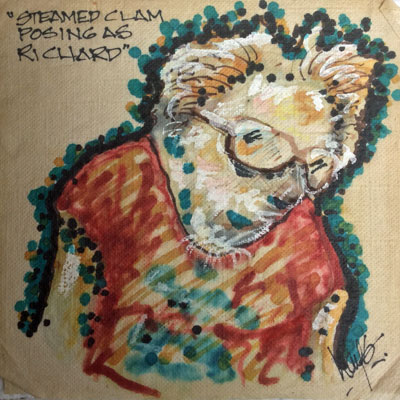
Sea Gull Cellar Bar Napkin Art, Jack Haye artist
Daniel Boey (fashion show director and producer, often called the godfather of Singapore fashion) wrote Behind Every Itch Is A Back Story: The Struggle of Growing up With Rash. We devoured it in an afternoon. Boey combines humor, inspirational stories (don’t like them but they work here) and interviews with an honest look at his own life. We see and feel his eczema, allergies and asthma (the three often go together). This is a good book even if you don’t have eczema, an essential book if you do.
But what doesn’t kill you only makes you stronger. Unless you have a massive breakout and no access to antihistamines. Then, you could be totally fucked. (Daniel Boey)
As for the science, we prefer the Oliver Sacks approach: personal stories and science mixed in a cocktail palatable to the general public. There are a variety of interesting articles out there. We particularly like The Itch by Atul Gawande (New Yorker, June 30, 2008), a macabre story of a woman whose itch was so extreme that she scratched right into her brain.
“Scratching is one of the sweetest gratifications of nature, and as ready at hand as any,” Montaigne wrote. “But repentance follows too annoyingly close at its heels.” For M., certainly, it did: the itching was so torturous, and the area so numb, that her scratching began to go through the skin. At a later office visit, her doctor found a silver-dollar-size patch of scalp where skin had been replaced by scab. M. tried bandaging her head, wearing caps to bed. But her fingernails would always find a way to her flesh, especially while she slept.
One morning, after she was awakened by her bedside alarm, she sat up and, she recalled, “this fluid came down my face, this greenish liquid.” She pressed a square of gauze to her head and went to see her doctor again. M. showed the doctor the fluid on the dressing. The doctor looked closely at the wound. She shined a light on it and in M.’s eyes. Then she walked out of the room and called an ambulance. Only in the Emergency Department at Massachusetts General Hospital, after the doctors started swarming, and one told her she needed surgery now, did M. learn what had happened. She had scratched through her skull during the night—and all the way into her brain. The Itch by Atul Gawande
The Ignominious Itch by Robert Kanigel (April 17, 1988) is an amusing piece that compares the pleasure of scratching to the pleasure of good food and good sex, something Sacher–Masoch might have worked into a fine novel. While the article is a bit dated, there is good information here as well as some thought-provoking anecdotes. The article does not address eczema specifically but the ideas discussed about why we itch and why we scratch are fascinating in their own right.
In a TV series on HBO (The Night Of) eczema plays a staring role. The lead character, a lawyer named John Stone (played by John Turturro) has eczema (as does the series creator Peter Moffat).
“I’m ready to jump out a window,” he moans to a dermatologist after being chastised for scratching his feet with a chopstick. [The Night Of]
As a character, Stone has tried it all, and his eczema continues to get worse. In life, this can be very real: Of the approximately 11 percent of adults who have an eczema diagnosis, about one-quarter have “chronic, unremitting symptoms.” [What The Night Of Gets Right About Eczema]
“Just level with me,” Stone asks the second dermatologist in the show. “Is there any fucking hope?” [The Night Of]
Maggie O’Farrell’s book, This Must Be The Place, is partially based on her real life experience with her daughter.
Too much central heating is one of the things that makes eczema worse. Other triggers include: dust, detergent, laundry or cleaning products, animal dander, nut and nut derivatives, egg, dairy, soy, perfume, flour, grass, soil, sand, pollen, saliva, latex, wool, synthetic fibers, paint, glue, leaves, seeds, wood smoke, gasoline, felt, shellfish, the seams of clothing, the labels of clothing, fabric trim, chlorine, polyester thread, soft toys, rope, fire starters, plastic cutlery, elastic. [This Must Be The Place]
How can I conclude this somewhat disjointed discussion on eczema? Not by providing you with advice or a cure (there is none).
Throughout the course of my eczema-filled life, I have received a plethora of advice for fighting the rash all contributed by well-meaning friends and strangers alike. They range from the logical to the weird and absurd, a combination of old wives’ tales and modern medicinal beliefs. I tried almost all of them and even experimented with the craziest theories, such was my desperate bid to find a cure. [Daniel Boey]
The best approach seems to be to learn to live with eczema as best you can and to focus on what you love to do in spite of it.
I do what I do because I believe in it and I love what I do, and that is reason enough for me to fight the good fight. [Daniel Boey]
Near the end of his book, Daniel Boey transcribes an interesting and informative interview with his doctor. When I came to the end of the interview, I burst out laughing. You’ll see why in a minute. I’ve received the same advice from my doctor, my accupressurist, and a good friend. Water. Drink as much as you can every day. Three quarts has been recommended. The fact is, I don’t drink much water. I am trying now to drink some every day but the most I can seem to get down is a quart, maybe a quart and a half. Now, this is what Boey’s doctor has to say.
Boey: What are your thoughts on traditional and new age beliefs? E.g. TCM and the consumption of Chinese herbs, or the consumption of coconut oil as an alternative to help heal allergies.
Doctor: There are plenty of new age remedies floating around with varying degrees of effectiveness. Some are legitimate to a certain degree and others are nothing more than marketing mumbo jumbo. I do believe somewhat in the traditional wisdoms. Just because the ancients have a different reasoning or philosophy of how it works doesn’t negate its effectiveness. For example, TCM, which evolved a long time ago, is effective for certain ailments, but it does not work for every condition. You need to be able to ascertain which part of it works and which doesn’t. It’s all about finding that balance between different cures—western medicine, traditional treatments and new age remedies each have their strengths and weaknesses and you do not need to rely on just one philosophy. It’s common sense, really. If it’s anecdotal e.g. people talking about the effectiveness of a product because someone else took it, or word of mouth hearsay from some aunty who is singing praises of it’s effectiveness because their friend took it, it’s really nothing more than marketing. The only old wives’ tale I swear by is to drink more water. Trust me, it’s one thing that helps with a lot of ailments but as in all things, too much of a good thing can be bad as well. Just remember that too much water can kill you.
So there you have it, the reason why Think in the Morning has been on sabbatical, some random thoughts on eczema, some reasons why we itch and a little philosophy to boot. Make sure you visit the links. They are an important part of this story. Over and out for now. Hoping to return with or without the rash.
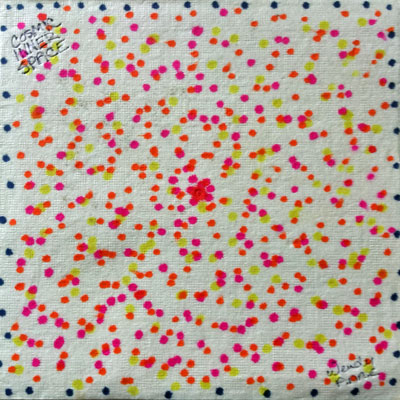
Sea Gull Cellar Bar Napkin Art, artist unknown

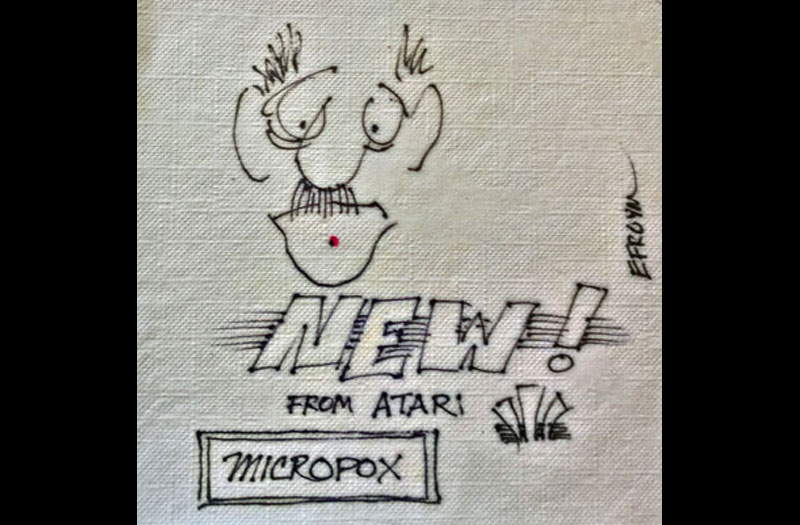
This certainly turned a lemon into lemonade, or at least a side dish of lemonade. Very interesting, David. Misery loves company, eh?
Thanks Larry! Yes, I’ve become an expert on it.
Have you ever had a rootcanal? If so, wach this documentary on Netflix: ROOTCAUSE
Bettylou
No, I have not.
So–the New Yorker published two short stories called “The Itch,” by two different writers, within ten years of each other?? I’m shocked, shocked!
I remember luxuriant cases of poison ivy when I was a wee bairn in Connecticut. At its apex, the rash became thousands of tiny tapioca-like pearlescent nodules. At first, it would itch just a little, sort of an innocent invitation to scratch. After those first tentative scratches, you were doomed. You’d go back for more, more, more, the itch intensified and blossomed, made your nerves shiver and the pearly nodules burst open; you’d scratch until your fingers ached and the skin wept and bled, and then the pleasure flipped directly over into pain. Then came the coating of Calamine lotion, with its no-nonsense hospital supply-room aroma. Smooth it on, let it dry to a chalky coating that contained the itch for a while. For a while, until the first little tentative invitational itch stirred and your fingers reached down of their own will for another round. Hot summer nights, no sleep, decades of life ahead.
Dear David:
I am SO SO SO SORRY!!!
Love.
Jack.